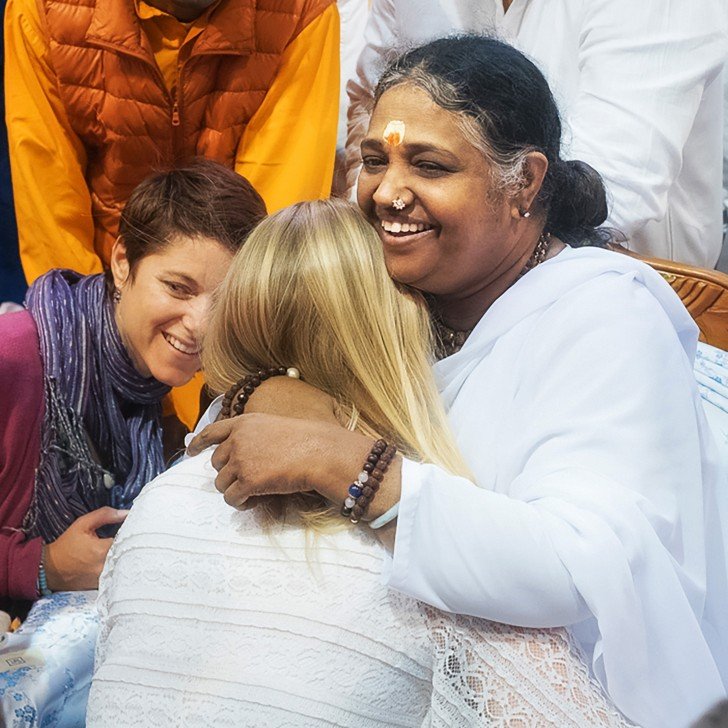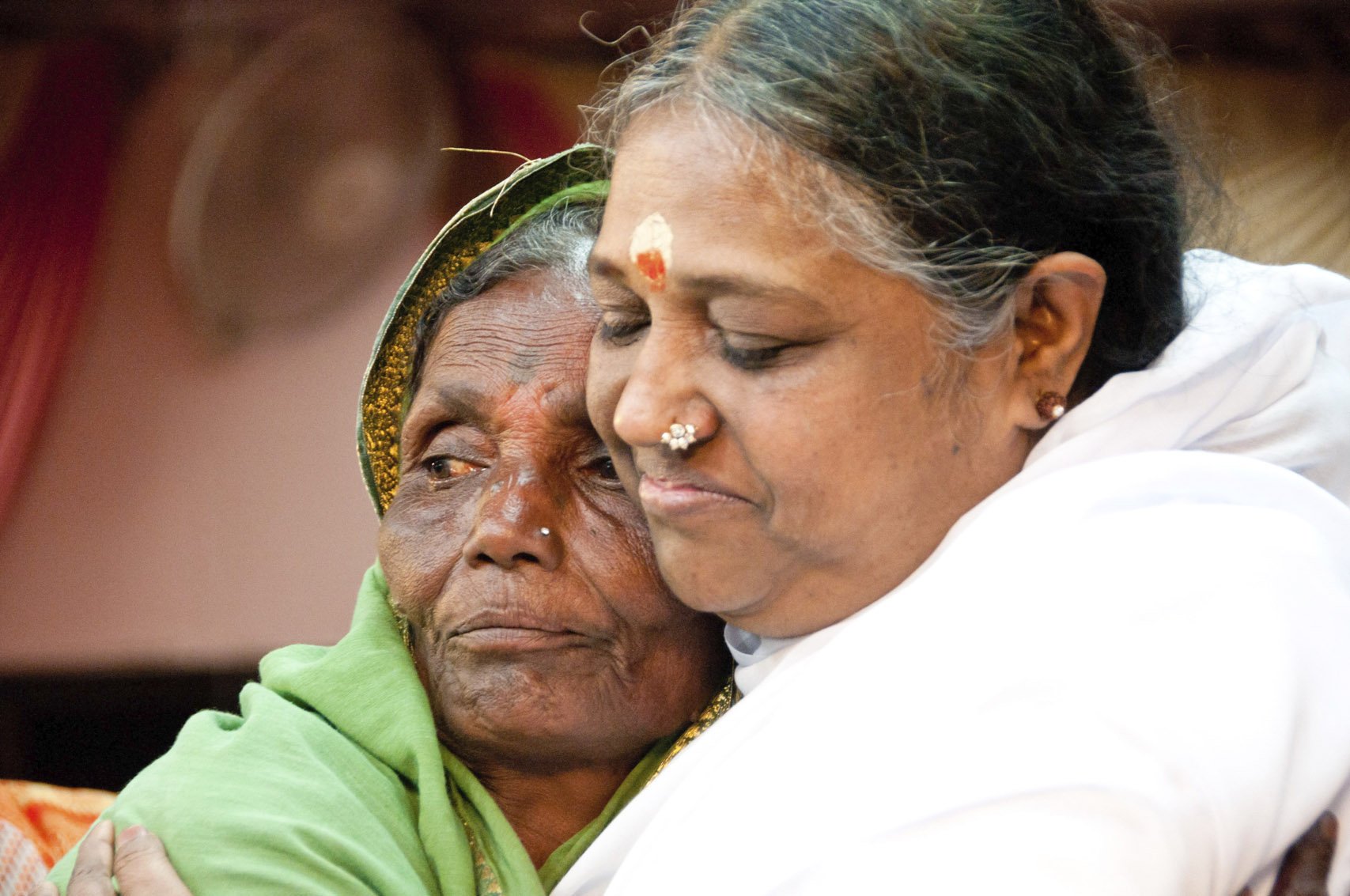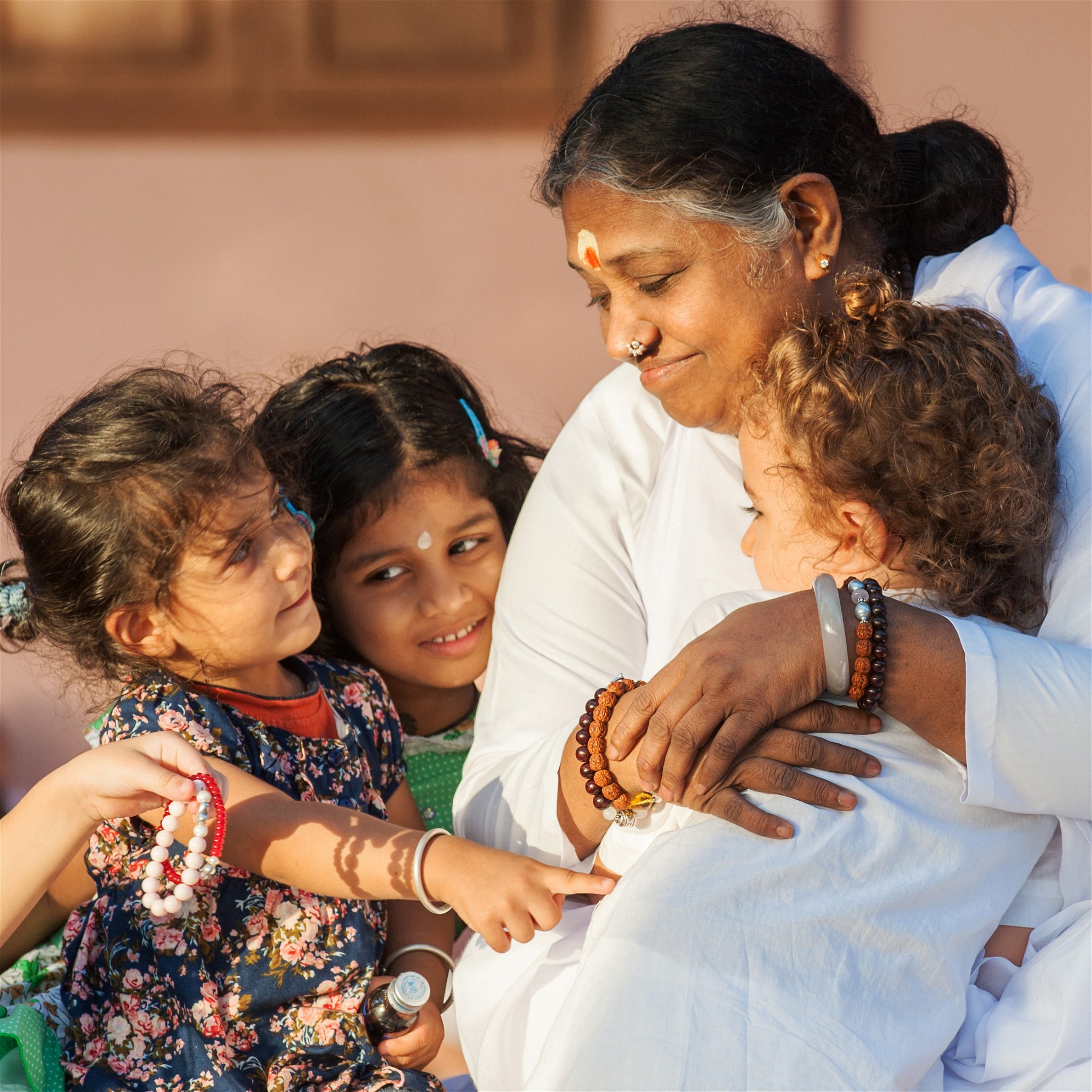Articles features
Love and peace cannot be forced on anyone: Amma

From India Life and Times magazine
www.ilatimes.omc/magazine
I used to smear cow dung on wounds and injuries, and it used to be a very effective antidote. Moreover, the cow is a religious symbol in India…. That said, it is unwise to use cow slaughter as a pretext for instigating social and political unrest.
Just as a flower bud opens up, love and peace just blossom within. You can’t force open the petals of a flower bud, can you? If you do so, it will destroy the beauty and fragrance of the flower.
Mata Amritanandamayi Devi is known throughout the world as Amma, or Mother, and is also referred to as the Hugging Saint.
Amma has embraced and comforted more than 34 million people worldwide, irrespective of religion or race. She says as a mother, she brings love to all her children and does not discriminate between them. Her life has been dedicated to alleviating the pain of the poor and those suffering physically and emotionally.
She does not ask anyone to change their religion, only contemplate the essential principles of their own faith and to try to live accordingly.
This writer interviewed her in 2011 while she was in New York. (see excerpts below)
IndiaLife and Times recently conducted another interview with her by email.
When is your next American tour? What are the main programs planned?
Amma: The next major US tour will be in June-July 2018. There will be events in all major cities where we have centers.
What major projects is the ashram carrying out presently?
Amma: There are many ongoing projects such as the building of free homes for the poor across the country, a welfare program for widows, educational assistance for children from underprivileged families, village-adoption programs, environmental-protection programs, women-empowerment programs, and vocational training for women in villages. In addition, the muth (monastery) undertakes relief and rehabilitation of places affected by natural disasters. Each of these projects was started in response to a certain situation, when there was a need. Through Amrita University, the ashram is also significantly involved in research-and-development projects that benefit the poor and the needy, such as the creation and deployment of a wireless landslide-detection system.
The political situation has changed both in India and America in recent years. Do you feel things are not going well?
Amma: I don’t wish to comment on political changes in any country. The current situation all over the world is bad, without bringing in politics. Real transformation can only happen within the minds of individuals. What we need are inspiring examples. Only those people who ‘walk the talk’ can bring about the positive transformations that they long for in the world.
Violence and intolerance are rising everywhere. What is your advice to overcome them?
Amma: Violence and intolerance have existed since times immemorial. The difference is only in degree. In the past, people had more understanding and compassion and, hence, were more forbearing and forgiving. In today’s world, people don’t give much importance to spiritual values and virtues. They think practicing these values and virtues have no material benefit. This attitude has greatly damaged the world society. People all over the world have become selfish, loveless, uncompassionate and vengeful. These negativities have become very deep-seated. Hence, there are no immediate solutions to surmount them.
In fact, everything good and bad begins from home. The home is the first and foremost training ground for cultural and value education. Obviously, parents play a major role in this regard. They have to set the right examples and instil the right values in their children—patience, kindness, empathy, truthfulness, respect for others, etc. Schools, colleges and other educational institutions come next. Teachers must be good role models. Politicians and rulers must also inspire their citizens. There should also be a well-thought-out curriculum for students to learn about the relevance of practicing these values in life.
Will this phase last long? What can we do to spread love and peace?
Amma: Love and peace are more subjective than objective. They dawn when there is an inner blossoming. Love and peace cannot be forced on anyone. Just as a flower bud opens up, love and peace just blossom within. You can’t force open the petals of a flower bud, can you? If you do so, it will destroy the beauty and fragrance of the flower. Hence, whether or not this phase is long or not, it depends the depth of people’s understanding. We frequently use the word ‘understanding’: ‘I understand you,’ ‘I understand your problem,’ etc. But understanding is not easy to practice. Doing so demands tremendous courage, patience and compassion.
Is there a reason you are not traveling as much as you used to?
Amma: That is not true. Except on one occasion when my presence was necessary here in Amritapuri, I have never cancelled any tours. That was during the 2004 Indian Ocean Tsunami, when the entire coastal belt of Kerala, especially this area, was badly affected. I had to cancel some of my travel programs to coordinate the relief and rehabilitation activities. Other than that, I have been traveling as usual for the last 31 years. In fact, the number of programs has increased.
Some people attack you and the work you is doing. What is your response?
Amma: Some people praise; some people criticize. Either way I am detached. The one who glorifies and is friendly today can become your worst detractor tomorrow and vice-versa. If someone considers criticizing me as their rightful dharma, I consider accepting all situations equally as my dharma. Whatever be the circumstance, loving and serving people selflessly is what is most important to me.
I am not against criticism. Criticism is good. I consider it a good fertilizer for growth. Nevertheless, one shouldn’t hurl stones at someone to fulfil a selfish agenda. Critics should be impartial. Their intentions should be pure and selfless. Criticism must not be prompted by animosity towards an individual or a group.
Cow protection has become a major issue now. What is your advice on this?
Amma: I advocate compassion toward all living beings. Cows are unique. They have a special place in Sanatana Dharma. In fact, Sanatana Dharma regards all living beings—even insentient objects—as divine. That’s the reason there are temples dedicated even to snakes, trees, birds and other animals, in India.
In ancient India, cows were treated like family members. The cow was the family pet too. It is said that cows shed tears if a family member died. People were dependent on cows for many of their daily supplies, such as milk and other dairy products. Cow dung and urine were used as disinfectants and fertilizers. I myself used to smear cow dung on wounds and injuries, and it used to be a very effective antidote. Moreover, the cow is also a religious symbol in India. All these factors together create an immense emotional bond between the people with the cow. Hence, for many, killing such a being is like killing a family member.
As undemanding and selfless providers, cows represent all creatures. The cow is the greatest giver in the world. Food companies—be they small, big or multinational—cannot exist without the cow and its milk. In return for just a handful of grass, a little water and fodder, cows give all they have to human beings. Thus the cow symbolizes a liberated being—one who gives everything without expecting anything in return.
That said, it is unwise to use cow slaughter as a pretext for instigating social and political unrest.
Excerpts from an interview in 2011
I asked Amma about a treasure, worth more than Rs 50,000 crore found at Sree Padmanabha Swami Temple in Thiruvananthapuram, the family temple of the erstwhile kings of Travancore. Amma’s family, which belongs to Quilon district, used to be the subjects of the king before India’s independence.
Amma saluted the wisdom of the kings who preserved the treasure. The kings and their relatives could have moved part of the treasure to their residence but did not. “I have seen people from the royal family living in abject poverty. Yet they did not take the treasure to help the family members.â€
She said she has no right to comment on the treasure. It is for the government and courts to take a decision in this regard. “But it is part of our heritage and it should be preserved as much as possible. In Europe, I have seen such places. An ancient agriculture land in Italy remains the same way and people are not even allowed to put a stone there.
“If there is still more left, it can be used for common good. It is temple property. But I will not say that it should be used for Hindus only. All are god’s children and before him there is no difference.â€
Amma said someone argued that “churches do not give their money for (use by) all others. Why must temples do so?â€
She said pain and sufferings are the same for everyone. There is no reason to divide people on the basis of religion.
Amma said she landed in trouble when she said India was not a Hindu rashtra. “For a mother, all children are the same. She cannot hurt anyone.â€
Her comments followed verbal attacks and criticism. But she is neither worried about the attacks nor concerned about the praises heaped on her.
I asked another question about the money and gold found at the chamber of Satya Sai Baba of Puttaparthy after his samadhi. She talked about her own muth (monastery), saying her organization does not keep gold worth more than Rs 15 lakh on the premises. If more is to be kept, the monastery has to pay a tax of Rs 1000 per Rs 100,000 worth of gold.
“Whenever we get more offerings, they are used for marriages of poor girls. I don’t wear a gold crown. I only use an old crown worth Rs 500 donated by a devotee long ago.â€
She said the muth follows all the laws of the country. It follows the rules of the monastery (sanyas muth), and it is modeled after Ramakrishna Mission ashrams.
The muth is ruled by a trust consisting of 11 people. Amma does not accept or give away money, but she does look into the accounts to make sure they are done correctly.
Many muths in India are owned or operated by families. But her muth follows the ‘monastic order’ and the property will go to the sanyasins next in line. The properties will be used only for charity.
Although Amma does not read newspapers, she said she is aware of what is happening around the world.
She said she has never faced any language problems anywhere in the world, although she speaks mostly in her native tongue, Malayalam. Her devotees could understand her. “A child can understand the language of the mother. Same with the mother.â€
Though she is unhappy that 10 times more people are in jail in the US although the population is much lower compared to India. Americans are generally more compassionate to the sufferings of others, she said.
“We can doubt if there is god. But we cannot doubt the sufferings of the people. If we show compassion to them, it is the best evidence for belief in god. The culture may be different in the US, but people are the same -- like fire or honey-- which is the same everywhere.â€
She spoke about her father, who was a businessman. When he died, he owned six boats, and bequeathed one to her.
Amma said she comes from a village where girls were not allowed to go out alone after they were 12. There were restrictions. Some people opposed or attacked her initially, but they too offered flowers to her over the years. “For me, both the stone and the flower are the same.â€
She said she has given hugs to millions of people over the years, and is not exhausted. “Love does not get bored.†She has been hugging people for the last 40 years. She never felt tired, although the body gets weaker as time passes. Even gold and iron get withered with use, she said.
When asked about her expectations 10 years from now, she said she lives in the present. If we live properly in the current moment, tomorrow will bring the right results. For her, no day is a bad day. She said her life flows like a river and she has not thought of where it would end. The work or institutions were not the result of any planning. They came into existence as a response to specific situations.
When the tsunami occurred in India, she did not ask for help. But help came from many parts. Even people who were poor sent her the produce from their tiny land.
When a journalist questioned her taking up residence in a posh penthouse, Amma said she also lives in ordinary places without amenities. She never thought of her home as big or small. Life itself is a lodge, she said. Bigger houses may not bring peace or a restful sleep.
Everything in the universe is interconnected and it has a rhythm. A minute vibration anywhere will affect the other places. Rather than expecting others to do the work, do it yourself, she said. She also advised the people to find contentment in themselves.
Amma said she is not opposed to modern technology or communication methods like Facebook. But without these facilities too, a mother can hear the cries of the children even when they are far away.







































